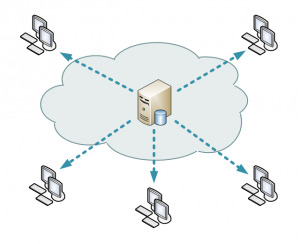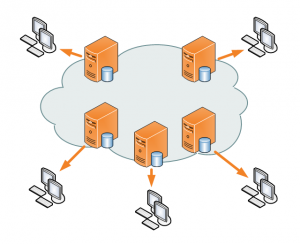A CDN, or Content Delivery Network, is a global network of servers that act as intermediaries for requests to your website. Using a CDN will speed up user access to your website, reduce bandwidth charges from your web host and even help secure your site against attacks and malicious users. Best of all, a good CDN service can had for cheap or even free.
In this article we’ll discuss the function, features and benefits of modern CDN services and review some of the more popular CDN services available.
To understand the benefit of a CDN, first consider the process of accessing a typical website.
- Your computer (or other device) requests a website address. e.g. google.com.
- Your request is sent to a Domain Name System (DNS) Server which looks up the numerical IP address of the website requested.
- Your request is directed to the proper address of the computer hosting the requested website.
DNS Servers are the key here. They are like the hidden address books of the Internet and they tell the world where to find your website. Without the use of a CDN all users visiting your website are routed directly to your web server or hosting account. This not only requires your server to work harder, but it slows requests and leaves you more vulnerable to attack.
So where does a CDN come in?
A CDN uses it’s own DNS servers to reroute your users through it’s own network of servers – and from there it takes one or more of several possible actions:
Caching and Compression
Your CDN service provider will check to see if the file or page had been previously requested and if it has a saved copy in its own cache. If so, the CDN will send them the cached copy of that file. In this case, your server is not bothered at all since the CDN is using it’s own copies of your most regularly requested files. This reduces your server load and bandwidth usage.
The CDN will also compress the files it serves from your site, further reducing the load time for your customers.
Don’t worry if your site has regularly changing content. the CDN cache will expire at set intervals decided by you and can also be configured to ignore things like dynamic content and shopping carts.
Geotargeting and Distribution
To further accelerate delivery, the CDN will route users to the server that is geographically closest to them. Since CDN’s have servers all over the world they can route user requests to the closest (and fastest) server in its own network. The net result is that your site loads faster for users – and can handle more users from all over the country and the world. The distributed server network also provides load balancing and redundancy by design.
Your CDN may also help you segment your traffic by geographic location so you can more easily serve content to different users from different regions.
Security
Your CDN will check to see if you are being flooded by suspicious requests that may be intended overwhelm your website and check to see if the user is a bot or a spider (automated software) with a bad reputation. It will block those requests and help your site stay online. CDN’s are also fully compatible with websites using SSL for security.
Choosing a CDN
Many of the larger hosting companies offer CDN services as an add-on. Several other companies specialize in offering CDN and related services. We’ve listed a few below.
CloudFlare
Cloudflare is the only CDN we’re aware of that offers their service for free. High level and enterprise plans range from $20 to $200 per month. (Link)
StackPath (formerly MaxCDN)
StackPath offers services with chat, phone and e-mail support from $9 per month and are a good choice for smaller companies looking for more personalized service. (Link)
Amazon CloudFront
Part of the Amazon Webservices suite. Cloudfront is an on-demand CDN that charges by usage. They offer a free 12 month limited trial to new customers. (Link)
Akamai
One of the first and largest CDN’s they provide the underlying CDN services for a number of other companies. Better suited for larger companies requiring enterprise-level services (i.e. expensive). (Link)
CDNNetworks
Korean based company whose more specialized CDN offerings include traffic acceleration services for traffic from emerging markets. (Link)
Need Help?
Need some help optimizing your website or adding a CDN? Please e-mail [email protected].

